What Is a Tuna Knife?
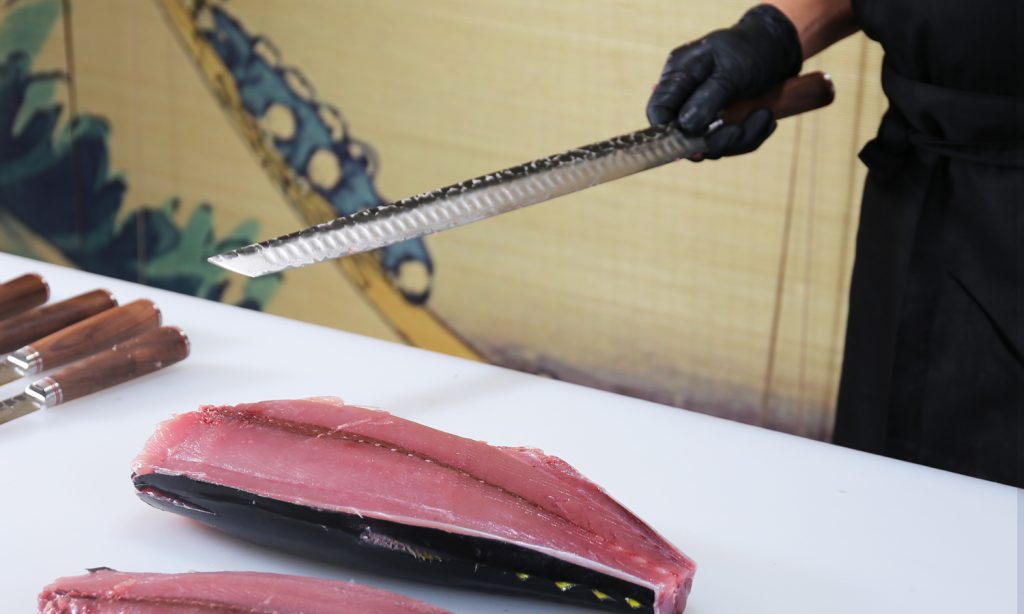
A tuna knife, also known as a sashimi knife or yanagiba, is a specialized Japanese kitchen knife primarily designed for slicing raw fish, particularly tuna, into thin, precise slices. Its long, narrow blade with a single beveled edge allows for clean cuts with minimal damage to the delicate flesh of the fish. The sharpness and precision of a tuna knife make it ideal for creating sashimi and sushi dishes, where presentation and texture are paramount. These knives are typically made from high-carbon steel and require careful maintenance to retain their sharpness and effectiveness.
Why Use a Tuna Knife?
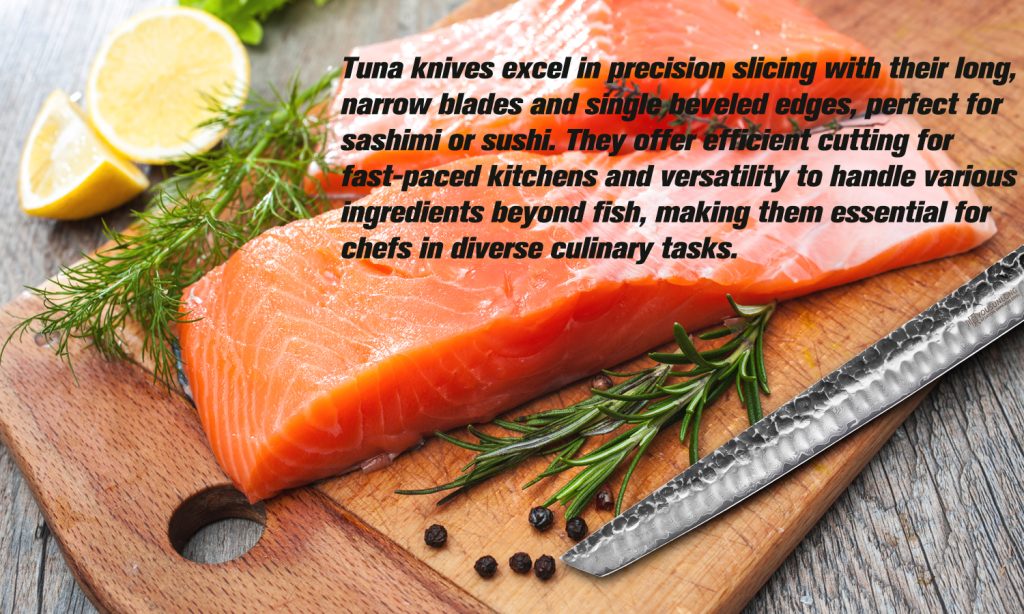
Using a specialized tuna knife offers several advantages:
- Precision: Tuna knives are meticulously crafted with a long, narrow blade and a single beveled edge, allowing for exceptionally precise cuts. This precision is crucial when slicing raw fish for sashimi or sushi, as it ensures uniform slices with smooth edges, enhancing the dish’s presentation and texture.
- Efficiency: The sharpness and design of a tuna knife enables efficient slicing, reducing the effort required to cut through the fish. This efficiency is especially beneficial in professional kitchens or high-volume settings where speed and consistency are essential for serving customers promptly and maintaining quality standards.
- Versatility: While tuna knives are specifically designed for slicing fish, they can also be used for cutting other delicate ingredients, such as vegetables or meats. The sharpness and fine edge of the knife make it versatile for various culinary tasks, providing chefs with a reliable tool for precision cutting in a range of applications.
What Makes a Good Tuna Knife?
A good tuna knife should possess several key qualities to effectively slice through the dense flesh of tuna:
- Sharpness: Sharpness is crucial for cleanly slicing through the tough flesh of tuna without tearing or damaging it. A sharp blade ensures precision cuts, which is especially important when working with delicate cuts of fish like tuna.
- Length: The length of the knife should be sufficient to handle large cuts of tuna effectively. A longer blade provides more surface area for slicing, allowing for smoother, more efficient cuts.
- Flexibility: Flexibility in the blade is important for maneuvering around bones and contours of the fish without exerting excessive force. This helps prevent damage to the flesh and ensures cleaner cuts.
- Comfortable Handle: A comfortable handle is essential for maintaining a secure grip and reducing hand fatigue during prolonged use. Ergonomically designed handles with a non-slip grip can enhance control and safety while cutting.
In addition to these qualities, durability and corrosion resistance are also important factors to consider, especially if the knife will be used frequently in a commercial kitchen setting. A good tuna knife should be made from high-quality materials such as Damascus steel to ensure longevity and ease of maintenance.
Why Is Damascus Steel a Great Material for a Tuna Knife?
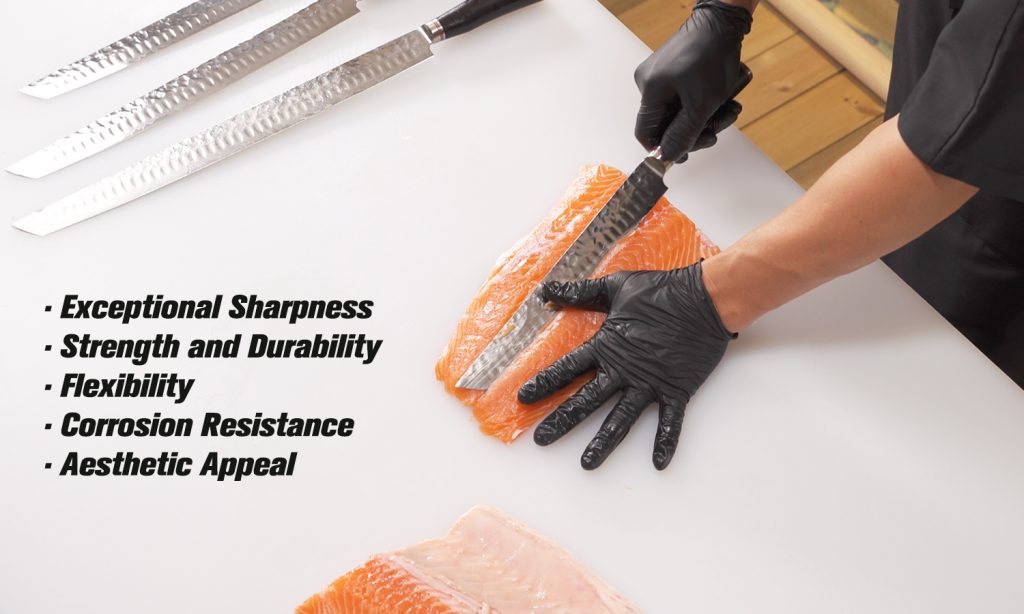
Damascus steel is highly regarded as a material for crafting tuna knives due to several advantageous characteristics:
- Exceptional Sharpness: Damascus steel blades are known for their ability to attain and retain a razor-sharp edge. This sharpness is crucial when slicing through the dense flesh of tuna, ensuring clean cuts without tearing or damaging the meat.
- Strength and Durability: Damascus steel is forged by layering and folding multiple types of steel together. This process creates a blade with superior strength and durability, allowing it to withstand the rigors of slicing through tough tuna flesh without dulling, chipping, or breaking.
- Flexibility: While Damascus steel is renowned for its hardness, it also possesses a degree of flexibility. This flexibility allows the blade to maneuver smoothly around bones and contours of the fish, facilitating precise and efficient cutting.
- Corrosion Resistance: Tuna knives are frequently exposed to moisture and acidic substances present in fish. Damascus steel exhibits excellent corrosion resistance, reducing the risk of rust and corrosion forming on the blade. This ensures the longevity of the knife and maintains its performance over time, even in harsh kitchen environments.
- Aesthetic Appeal: Beyond its functional benefits, Damascus steel is prized for its unique and beautiful patterns created by the layering and folding process. A tuna knife crafted from Damascus steel not only performs exceptionally well but also adds a touch of elegance to the kitchen, making it a favorite among chefs and enthusiasts alike.
Overall, the combination of exceptional sharpness, strength, flexibility, corrosion resistance, and aesthetic appeal makes Damascus steel an excellent material choice for crafting high-quality tuna knives.
Best YOUSUNLONG Tuna Knives for Slicing Tuna
【Walnut Handle Series】
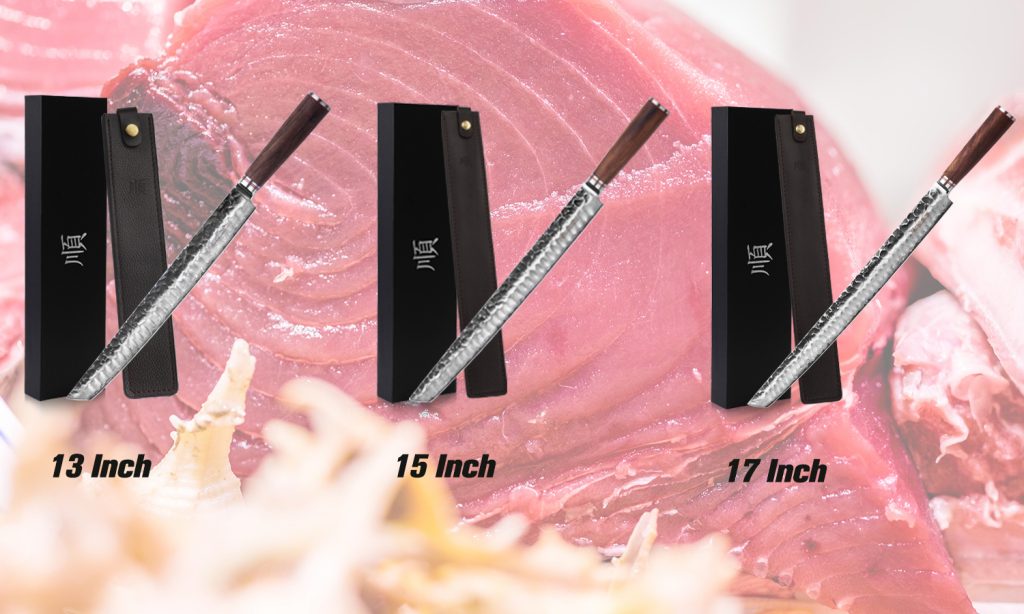
【Ebony Handle Series】
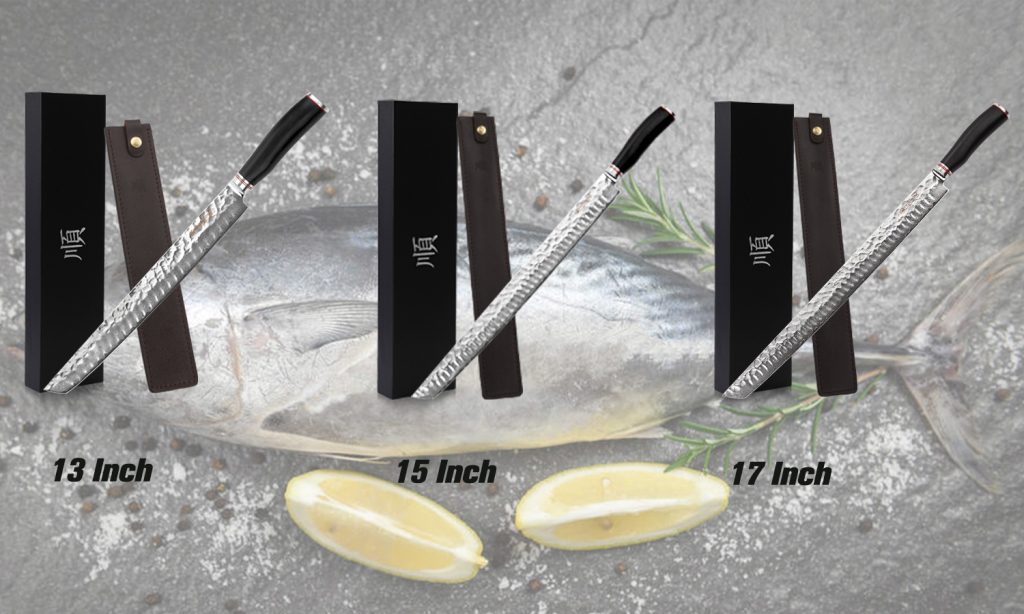
The YOUSUNLONG offers the best tuna knives for slicing tuna:
- 13-Inch Tuna Knife: Ideal for precise slicing tasks, this knife is suitable for smaller cuts of tuna.
- 15-Inch Tuna Knife: Perfect for medium-sized tuna cuts, providing versatility and efficiency in slicing.
- 17-Inch Tuna Knife: Designed for larger tuna cuts, ensuring precision and ease of use for professional chefs and enthusiasts alike.
With their walnut and ebony handles, these knives combine elegance with functionality, making them excellent choices for slicing tuna with precision and ease.